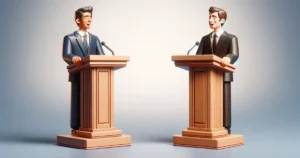Controversial funny topics have a unique ability to spark lively debates while also eliciting laughter. In the realm of humor, these topics walk a fine line between provocation and amusement, often challenging societal norms and preconceived notions with a witty twist.
From poking fun at taboo subjects to addressing polarizing issues with a comedic lens, controversial funny topics invite us to explore the absurdities of life while encouraging us to confront our own perspectives with a healthy dose of humor.
In this article, we delve into the realm of controversy with a light-hearted approach, embracing the power of laughter to navigate through the most contentious of subjects. So, buckle up for a ride filled with wit, satire, and perhaps a few raised eyebrows, as we journey into the world of controversial funny topics.
Should controversial funny topics be discussed?

Discussing controversial funny topics can be a bit of a tightrope walk. On one hand, humor can often be a way to explore and cope with difficult or taboo subjects, helping to break down barriers and encourage open dialogue. On the other hand, it’s essential to be mindful of the potential for humor to trivialize or offend, especially when dealing with sensitive issues.
It really depends on the context, the audience, and the intent behind the discussion. Comedy has a long history of pushing boundaries and challenging norms, but it’s crucial to approach controversial topics with sensitivity and awareness of the potential impact on others.
Ultimately, it comes down to understanding your audience, being respectful, and recognizing when humor might not be appropriate or when it could potentially do harm. It’s possible to tackle controversial topics in a funny and thought-provoking way, but it requires careful consideration and empathy.
What is controversial funny topics?
Controversial funny topics are subjects that are typically considered sensitive, taboo, or divisive, but are approached in a humorous manner. These topics often touch on social, political, or cultural issues that provoke strong reactions or differing opinions.
Examples of controversial funny topics might include:
- Religion: Jokes about different religious beliefs or practices.
- Politics: Satire and humor about politicians, political parties, or current events.
- Race and ethnicity: Humorous commentary on racial stereotypes or cultural differences.
- Gender and sexuality: Jokes about gender roles, sexual orientation, or gender identity.
- Social issues: Comedy addressing topics such as poverty, inequality, or mental health.
- Taboo subjects: Humor about death, illness, or other traditionally “off-limits” topics.
While humor can be a powerful tool for discussing and processing controversial subjects, it’s essential to approach these topics with sensitivity and awareness of potential sensitivities or harm. Comedy should aim to provoke thought and foster understanding rather than perpetuate stereotypes or offend others.
200 Controversial funny topics

Here’s a list of 200 controversial funny topics, divided into sections that you can consider.

